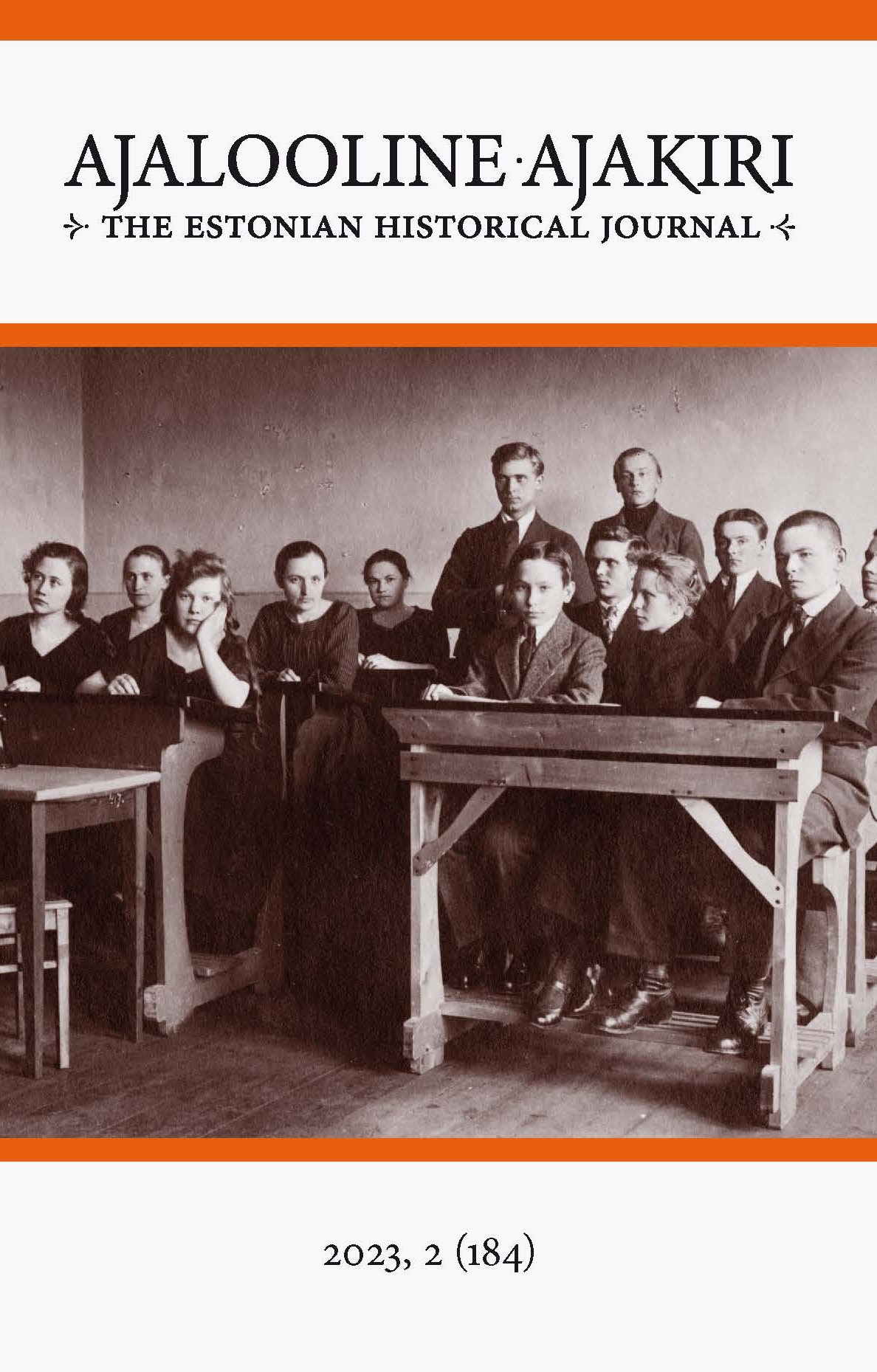Tundlikest teemadest ajalooõpetuses Eesti õpilaste vaates [Abstract: Controversial and sensitive issues from the perspective of Estonian pupils]
DOI:
https://doi.org/10.12697/AA.2023.2.02Keywords:
controversial and sensitive topics in history teaching, history didactics, metacognition and reflection, open dialogueAbstract
Abstract: Controversial and sensitive issues from the perspective of Estonian pupils
This article analyses the teaching of controversial and sensitive topics in the context of Estonian history education and answers the following questions:
- Which topics in history are controversial and sensitive according to pupils? How important is it for pupils to learn about controversial topics?
- How is the perceived sensitivity of topics related to personal background factors of pupils (nationality, ethnicity, gender, age) and contextual factors (school location, mother tongue, and mother’s level of education)?
In the theoretical part of the article, a brief overview is given of the general context of history education in Estonia and of research on history education to date, and reasons for the emergence of controversial and sensitive topics are discussed. Traditionally, the purpose of teaching history has been to narrate the history of a nation and to foster a cohesive society. The Second World War, the Holocaust, and the collapse of colonial systems led to a rethinking of history education in Western Europe and North America. Questions were raised about the role of history education in a multicultural democratic society. Equally, there was an interest in how to deal with issues of history that are controversial and sensitive for different communities, often based on traumatic experiences from the past.
Developments in Estonian history education differed from those in Western Europe, affected by Estonia’s annexation into the Soviet Union and limitations on Estonian self-determination, since education was controlled from Moscow until the early 1990s. After Estonia regained its independence, a new educational system was created and the role of history education in a democratic society was comprehensively redefined. One of the most controversial issues, both in society and in the teaching of history, has been the differences in how the Estonian and Russian communities perceive the Second World War and the subsequent occupation. Today, the war that broke out in Ukraine in 2022, as well as the changing and interconnected world, and the growing multiculturalism of Estonian society and schools have given the debate new momentum.
In the empirical part, we provide an overview of the results of a quantitative questionnaire that focused on pupils’ perceptions of sensitive topics. A total of 224 pupils in grades 9 and 11 participated in the survey. Of the pupils who completed the questionnaire, 91 were boys and 133 were girls, 107 were aged 14–16 and 117 were aged 17–19. The results indicate that the most sensitive topics for pupils are from the 20th century, especially the Second World War and the subsequent Soviet occupation. Discussing controversial and sensitive topics in school is especially important for ethnic Russian pupils or pupils with multiple ethnic identities, indicating their post-memory. An important theme that emerged in the pupils’ responses was the degree of subjectivity in the perception of sensitive topics and the link to pupils’ diverse personal and contextual sources of identification, such as nationality, gender, age, and home language, all of which intertwine in complex ways to create the personal subjective interpretation filter. However, one of the main determinants of interpretation was still the dominant national narrative. For pupils of Estonian nationality, the trauma narrative of the Second World War is noticeable in their interpretations. Contradictions were greater for pupils of Russian ethnicity. These included references to topics from Russia’s imperialist narrative (e.g. the Great Northern War, collaborationism, US expansionism, imperialist Russia, the Second World War, the collapse of the USSR, Putin’s Russia) as well as the Russian community’s trauma experience after the collapse of the USSR, the loss of its former political position, and a perceived sense of injustice related to such historical events (the topics of the collapse of the USSR, democracy, and freedom). Differences according to ethnic background were evident not only in thematic differences but also in the general perceived sensitivity to the issues. Pupils with multiple identities and ethnic Russian pupils found these topics to be more sensitive than pupils of Estonian ethnicity. These reactions instead point to the context outside the classroom, to the different historical experiences of the Estonian and Russian communities, and reflect the particularities of Estonian memory politics, the mistrust between the two communities, and the lack of reflexive and open dialogue between different understandings of history. Sensitivity may indicate not only a certain behavioural adaptation to the environment, but also the formation of identity through resistance, and a possible perceived threat to the group’s cultural traditions.
Education, including history education, cannot by itself change the deeper structural roots of the sensitivity of issues. Controversial and sensitive issues reflect social context. Pupils’ perceptions are shaped by the socio-cultural environment. Dealing with controversial and sensitive issues requires a reassessment of previous interpretations, both individually and collectively. It is therefore important to support the decolonisation of Soviet-era history-related discourse, both in the school system and in society at large. This means processing the emotive aspects of difficult historical encounters and creating new visions for the future for all concerned in an effort to avoid victim narratives and the downplaying one’s own agency. Recognising the need for memory work is important because the problem is not in abstract narratives, but in the way in which these narratives influence interpersonal interaction and everyday life. They are often unconsciously transmitted by all members of society. In the field of education, it is important to redefine the school system as a unified Estonian school and to include controversial and sensitive topics in the curriculum, while also recognising the limiting ways of talking about the social world, which reinforce the boundaries between different communities.

